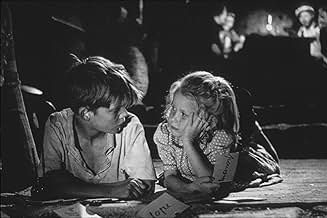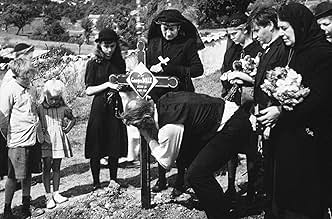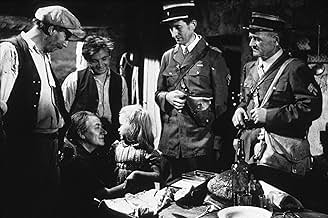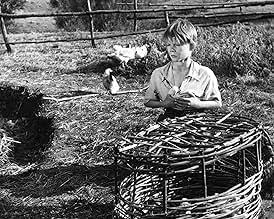Jeux interdits
- 1952
- Tous publics
- 1h 26m
IMDb RATING
8.0/10
14K
YOUR RATING
A young French girl orphaned in a German air attack is befriended by the son of a poor farmer, and together they try to come to terms with the realities of death.A young French girl orphaned in a German air attack is befriended by the son of a poor farmer, and together they try to come to terms with the realities of death.A young French girl orphaned in a German air attack is befriended by the son of a poor farmer, and together they try to come to terms with the realities of death.
- Nominated for 1 Oscar
- 8 wins & 2 nominations total
Marcel Mérovée
- Raymond Dollé
- (as Pierre Merovée)
Denise Péronne
- Jeanne Gouard
- (as Denise Perronne)
Marie-Pierre Casey
- Infirmière
- (uncredited)
André Enard
- Le premier gendarme
- (uncredited)
Marcelle Feuillade
- La mère de Paulette
- (uncredited)
Roger Fossey
- Le père de Paulette
- (uncredited)
Featured reviews
Never has the world of adults seemed so utterly stupid, brutal and senseless than through the eyes of two innocent children who have to deal with pain, loss, death and war. And yet, the film is gentle, subtle, inobtrusive in its portrayal of the grown-up's follies, and refreshingly unsentimental about presenting the pain and beauty of childhood.
A masterpiece.
Few other titles come to mind in which child actors have so much to bear, and they manage it effortlessly & unforgettably.
[The only thing that bothers me is the too convincing 'acting' of the dead /?/ dog...]
A masterpiece.
Few other titles come to mind in which child actors have so much to bear, and they manage it effortlessly & unforgettably.
[The only thing that bothers me is the too convincing 'acting' of the dead /?/ dog...]
I am incapable of writing reams about films I admire because words do no justice to the magic they conjure.
FORBIDDEN GAMES left me speechless when I first saw it two decades ago.
It is ABOUT two French children, a peasant boy, a Parisian girl, who become close friends as World War 2 ravages Europe.
The film LOOKS at the way warfare effects the innocent and transforms one's view of death.
Director Rene Clement sets the story in a rural village and peoples his story with some of the most authentic characters ever to tred the silver screen. He employs humour, horror and humanism to tell his story and solicits an incredible performance from moppet Brigitte Fossey.
It's a tearjerker, too, it's emotionally delicate, and it's perfectly manipulated drama -- all good drama is.
Its power is its apparent simplicity.
A love letter to cinema that is also one of the greatest and most haunting war movies ever made.
The imagery and the heart-rending music score will remain with you forever.
FORBIDDEN GAMES left me speechless when I first saw it two decades ago.
It is ABOUT two French children, a peasant boy, a Parisian girl, who become close friends as World War 2 ravages Europe.
The film LOOKS at the way warfare effects the innocent and transforms one's view of death.
Director Rene Clement sets the story in a rural village and peoples his story with some of the most authentic characters ever to tred the silver screen. He employs humour, horror and humanism to tell his story and solicits an incredible performance from moppet Brigitte Fossey.
It's a tearjerker, too, it's emotionally delicate, and it's perfectly manipulated drama -- all good drama is.
Its power is its apparent simplicity.
A love letter to cinema that is also one of the greatest and most haunting war movies ever made.
The imagery and the heart-rending music score will remain with you forever.
Wonderfully wry, ribald, and ironic look at children, life, and death in the provinces. This must be one of the best examples of poetic realism much better than any Renoir you'll see it's alive and humane, comprising a hundred little iconic cinema moments and several major ones.
A little girl, whose parents are killed in an air-raid at the beginning, wanders into a nearby farm clutching her dead dog and is taken in. She becomes attached to the boy at the farm and they start to expand her dog's grave into a little cemetery of dead animals. There's nothing macabre or sinister about this, nor (as the blurbs maintain) is it particularly a statement about the effect of war on children - it's simply the sort of thing kids might do. When they start pinching crosses from the real cemetery though, they are in for it.
The peasant family are a hoot. The father has a hilarious running feud with his neighbour; the daughter is having an illicit affair with the neighbour's son; the elder son succumbs to a tragi-comic demise after an innocuous accident; the second is a good-natured hick; and the youngest boy gets clouted by his father at every turn ("Take that!", says the father as he smacks him across the head "...and that!" says his sister as she plonks some flowers into his hand). Their every movement is bursting with rough humour and vitality and we are being shown something interesting in every frame. It comes vividly to life, and as an evocation of childhood is up there with Selznick's Tom Sawyer and "Spirit of the Beehive".
Remarkable performances from the two children. There's no sanctimoniousness or even self-awareness to it; Clement got it down and it came out right.
A little girl, whose parents are killed in an air-raid at the beginning, wanders into a nearby farm clutching her dead dog and is taken in. She becomes attached to the boy at the farm and they start to expand her dog's grave into a little cemetery of dead animals. There's nothing macabre or sinister about this, nor (as the blurbs maintain) is it particularly a statement about the effect of war on children - it's simply the sort of thing kids might do. When they start pinching crosses from the real cemetery though, they are in for it.
The peasant family are a hoot. The father has a hilarious running feud with his neighbour; the daughter is having an illicit affair with the neighbour's son; the elder son succumbs to a tragi-comic demise after an innocuous accident; the second is a good-natured hick; and the youngest boy gets clouted by his father at every turn ("Take that!", says the father as he smacks him across the head "...and that!" says his sister as she plonks some flowers into his hand). Their every movement is bursting with rough humour and vitality and we are being shown something interesting in every frame. It comes vividly to life, and as an evocation of childhood is up there with Selznick's Tom Sawyer and "Spirit of the Beehive".
Remarkable performances from the two children. There's no sanctimoniousness or even self-awareness to it; Clement got it down and it came out right.
10jonr-3
I don't know why I never managed to see "Les Jeux interdits" until tonight, an August evening in 2003, more than a half-century after the film's release. I'd heard about it ever since I started studying French in college in 1958.
The amount of comedy in the film surprised and pleased me. I'd always had the impression the film was morbid and creepy. I didn't find it so; poignant, occasionally disturbing, even heart-wrenching, but not morbid at all. The acting by the two children playing Michel and Paulette is the most amazing pair of performances I've ever seen. I learned from postings here that the film was made under far less than optimal conditions, but the flaws that do show up in the film, chief among them the abrupt and unsatisfactory ending, are so negligible in contrast to the overwhelming emotional and acting values throughout, that I rated this film a ten, the first time I've reached for the highest number.
I cannot imagine anything finer than this film, whose images will probably haunt me for the rest of my life.
The amount of comedy in the film surprised and pleased me. I'd always had the impression the film was morbid and creepy. I didn't find it so; poignant, occasionally disturbing, even heart-wrenching, but not morbid at all. The acting by the two children playing Michel and Paulette is the most amazing pair of performances I've ever seen. I learned from postings here that the film was made under far less than optimal conditions, but the flaws that do show up in the film, chief among them the abrupt and unsatisfactory ending, are so negligible in contrast to the overwhelming emotional and acting values throughout, that I rated this film a ten, the first time I've reached for the highest number.
I cannot imagine anything finer than this film, whose images will probably haunt me for the rest of my life.
This great film has been well-described here and elsewhere, and I don't know that there's a lot more to be said about its worth. It made a great impression on me when I first saw it in an English-dubbed version on late night TV many years ago, and it has always been a favorite of mine since then.
But it seems there's often a bit more to learn about an old favorite film. In this case, I acquired a foreign DVD edition of "Les Jeux interdits" which contained, besides some interesting outtakes, a later-deleted prologue and epilogue to the film which I had never heard of before. These did not have English subtitles, so I had to guess what was being said, but Clement's direction and the acting of young Fossey and Poujouly are so good that I could follow almost all of it without knowing very much French at all. They establish a sort of framing device for the story, in that the plot of the film is in fact a story from a book being read by the boy to the girl. In the prologue we see Fossey and Poujouly, not dressed in grimy peasant clothes at all, but clean, scrubbed, and in their Sunday-best, sitting on a log over a stream. The boy begins reading the story of Paulette and Michel out of the book, and we fade into the film as we now know it, beginning with the refugees on the road. After the sad ending of the story, we fade back to the epilogue, where the boy has just finished reading. The heartbreaking ending of the story has the girl in tears of despair. So the boy, in an act of kindness to her, pretends to read a blank page at the end of the book and makes up a happy ending to the story to dispel her grief.
I guess I can see why it might have been deleted later, as it tends to soften the force of the central narrative a bit and the devastating sadness of its ending. But it really is a beautiful and touching bit of film, and I'm very happy to have a chance to see it, as I don't think it's been seen much over the years, or that many fans of this film are even aware of it.
The outtakes are quite interesting as well, as they show some alternate takes of familiar scenes, including the snapping of that little blackboard thing with the title of the film at the start of the shots (what's that thing called, anyway?). There is also some footage of the old owl in the rafters of the mill, in which you can occasionally see Clement coming into the frame to turn the owl's head around toward the camera when it keeps turning away.
With or without the missing prologue and epilogue this is a great masterpiece that you should experience.
But it seems there's often a bit more to learn about an old favorite film. In this case, I acquired a foreign DVD edition of "Les Jeux interdits" which contained, besides some interesting outtakes, a later-deleted prologue and epilogue to the film which I had never heard of before. These did not have English subtitles, so I had to guess what was being said, but Clement's direction and the acting of young Fossey and Poujouly are so good that I could follow almost all of it without knowing very much French at all. They establish a sort of framing device for the story, in that the plot of the film is in fact a story from a book being read by the boy to the girl. In the prologue we see Fossey and Poujouly, not dressed in grimy peasant clothes at all, but clean, scrubbed, and in their Sunday-best, sitting on a log over a stream. The boy begins reading the story of Paulette and Michel out of the book, and we fade into the film as we now know it, beginning with the refugees on the road. After the sad ending of the story, we fade back to the epilogue, where the boy has just finished reading. The heartbreaking ending of the story has the girl in tears of despair. So the boy, in an act of kindness to her, pretends to read a blank page at the end of the book and makes up a happy ending to the story to dispel her grief.
I guess I can see why it might have been deleted later, as it tends to soften the force of the central narrative a bit and the devastating sadness of its ending. But it really is a beautiful and touching bit of film, and I'm very happy to have a chance to see it, as I don't think it's been seen much over the years, or that many fans of this film are even aware of it.
The outtakes are quite interesting as well, as they show some alternate takes of familiar scenes, including the snapping of that little blackboard thing with the title of the film at the start of the shots (what's that thing called, anyway?). There is also some footage of the old owl in the rafters of the mill, in which you can occasionally see Clement coming into the frame to turn the owl's head around toward the camera when it keeps turning away.
With or without the missing prologue and epilogue this is a great masterpiece that you should experience.
Did you know
- TriviaIn a television interview ("Vivement Dimanche Prochain", France 2, 17 April 2005) Brigitte Fossey, who played the little Paulette, revealed that the film had originally been shot as a short, and then it was later decided to extend it into a feature film. Unfortunately she had lost her milk teeth and Georges Poujouly (who plays the boy Michel) had had his hair cut to play in Nous sommes tous des assassins (1952). So, in many scenes of the movie Paulette has false teeth and Michel is wearing a wig.
- GoofsThe poor parents are killed by a Focke-Wulf 190. This kind of plane didn't exist at the moment of the "battle of France" in May and June 1940.
- Crazy creditsThere are two alternate opening credits:The main credit starts with a story book and a female hand opens the book to reveal the credits. The alternate still has the same book but this time we are introduced to the two main characters who are sitting by a lake. In this version, Michel's hand is turning the page and in between the scenes he tells Paulette that he's going to tell a story.
- ConnectionsFeatured in Le ciné-club de Radio-Canada: Film présenté: Jeux interdits (1959)
- How long is Forbidden Games?Powered by Alexa
Details
- Release date
- Country of origin
- Official site
- Language
- Also known as
- Croix en Bois, Croix en Fer
- Filming locations
- Production companies
- See more company credits at IMDbPro
Box office
- Gross US & Canada
- $33,284
- Opening weekend US & Canada
- $4,316
- Apr 26, 2015
- Gross worldwide
- $33,897
- Runtime
- 1h 26m(86 min)
- Color
- Aspect ratio
- 1.37 : 1
Contribute to this page
Suggest an edit or add missing content



























